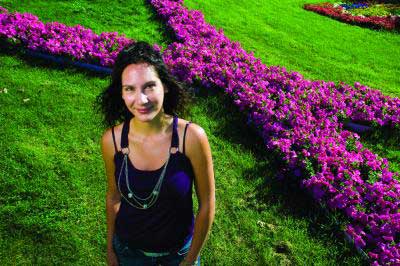At a time when most kids were glued to TV shows about talking purple dinosaurs, Kristy Kutanzi was exploring the inner workings of the world around her.
"I have always had a curious mind," she explains. "As a child, I loved to experiment. My parents bought me a book with basic science experiments and explanations for general phenomena – a book that I read from front to back countless times."

They also bought her a microscope to indulge her fascination with "things too small to be seen by the human eye," says the Grassy Lake, Alta., native.
But it wasn't until she began her undergraduate degree at the U of L and had an opportunity to work in the lab of Dr. Olga Kovalchuk for her honours program, that Kutanzi realized her sights were set on becoming a scientist.
"The practical training that I received in labs during my undergrad was a turning point for me," says Kutanzi. "Dr. Kovalchuk fostered my interest in science and encouraged me to pursue a higher level of education in the field. Undoubtedly, she has provided and continues to provide me with invaluable tools and advice to succeed in my research career."
These days, Kutanzi is well on her way to realizing her ambitions. She's now in the MSc/PhD transfer program, which allows students with research potential to enter the PhD program without defending their master's thesis. She continues to work with Kovalchuk on a project to unravel the epigenetic changes that precede the development of cancer.
While traditionally researchers have studied the genetic influences of cancer, Kutanzi is working to understand the epigenetic factors that "turn on" cancer genes. Through funding from the Canadian Breast Cancer Foundation (Prairies-NWT chapter) and the Alberta Cancer Research Institute, Kutanzi is looking at how estrogen may trigger genes that cause breast cancer, the leading cause of death for women 30 to 55 years of age.
Kutanzi's work on the topic has not gone unnoticed and her amazing aptitude for science has earned her high praise. In addition to being an Alberta Heritage Foundation for Medical Research scholar, Kutanzi recently earned a prestigious Vanier Canada Graduate Scholarship, valued at $50,000 per year for up to three years.
The Vanier program, launched by the Government of Canada in 2008, aims to attract and retain world-class doctoral students who demonstrate a high standard of scholarly achievement in graduate studies.
The prestigious award is a big boost for Kutanzi's burgeoning career. Not only does the funding allow her to focus on the research, but it allows her to present her results at international scientific conferences. There, she'll develop research collaborations and investigate current and future prospects in her field.
But perhaps most importantly, the award brings recognition to a dangerous disease.
"Receiving the Vanier reflects the merit of my field of research," Kutanzi explains graciously. "It brings national attention to the value of researching breast cancer development, particularly during the early stages when there's a greater chance for us to discover a successful treatment."
